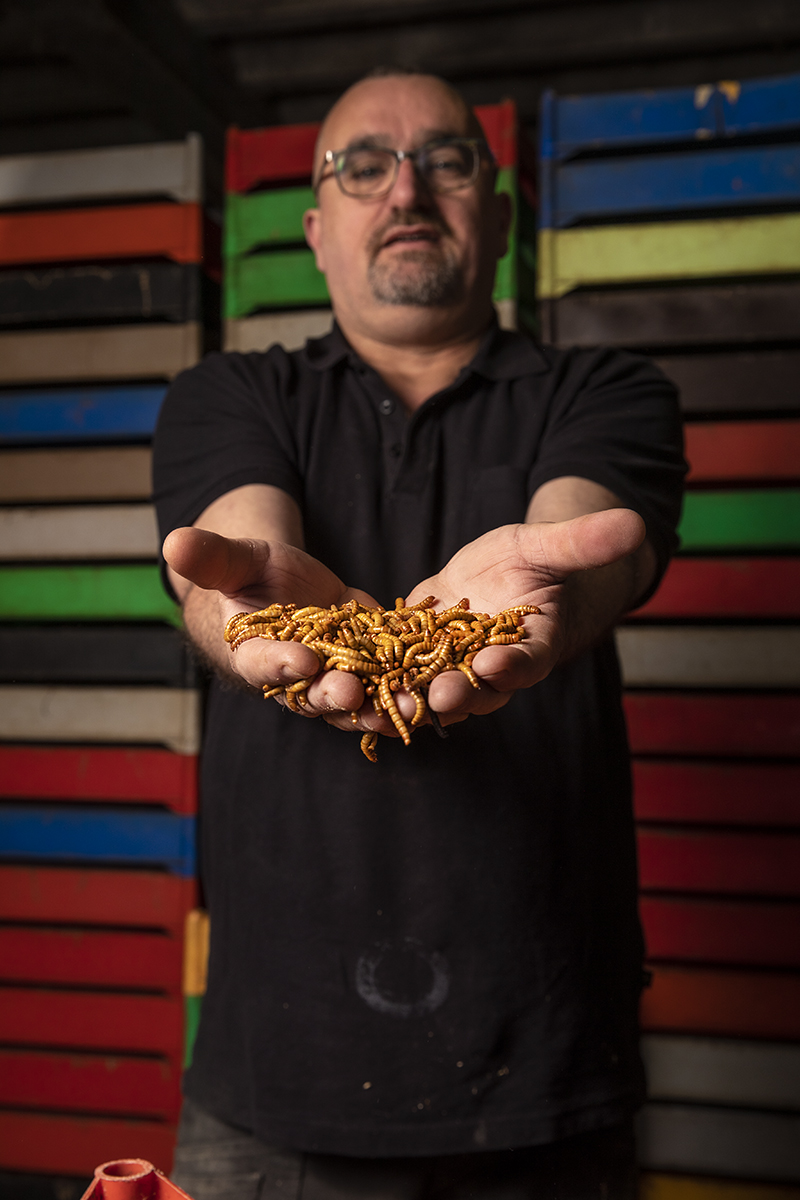
Marba
In Apeldoorn staat de oudste meelwormkwekerij van Nederland en de op één na oudste van Europa. Sinds 1938 heeft Marba op diverse plekken binnen de gemeente Apeldoorn meelwormen gekweekt, de laatste 40 jaar op de eigen kwekerij aan de Gladsaxe. Destijds waren de afnemers particuliere vogel en andere kleinvee bezitters die de meelwormen als voer voor hun dieren gebruikten. En werden de pakketjes met de bakfiets naar Van Gend en Loos gebracht. Vandaag de dag is Marba één van de grootste producenten van Nederland.
Eigenlijk is de naam meelworm verkeerd. Het is namelijk geen worm maar een insect. Wat wij zien als meelwormen zijn eigenlijk de larven van de meeltor. De lange historie van meelwormen kweken is best bijzonder. Hoewel het ogenschijnlijk niet moeilijk lijkt houden toch maar weinig kwekers het meelwormen kweken lang vol. Binnen Marba is zeer veel deskundigheid en vakmanschap beschikbaar waardoor het bedrijf al zo lang bestaat.
De meelwormen van Marba worden als levende have verkocht aan de professionele markt. Dit zijn voornamelijk (groot))handelaren en winkels. Zij verkopen dit weer door aan bezitters van tropische vogels en tuinvogels en reptieleigenaren. Het kweken van meelwormen is echt een Nederlandse specialiteit. Zo komt de helft van alle twintig kwekers in Europa uit Nederland. Reden waarom de meelwormen ook veel geëxporteerd worden. Veel afzet gaat ook naar landen met een grote vistraditie. Je kunt meelwormen prima als aas gebruiken bij het vissen op forel en zalm. Dit is erg populair in bijvoorbeeld de Scandinavische landen, Groot Brittannië en ook de USA. De wormen gaan veelal tezamen met de bloemenexport op vliegtuig naar de USA.
Marba is één van de grootste producten van meelwormen in Nederland. Op weekbasis worden er zo’n 750 tot 1.000 kilo afgezet. Dit zijn heel veel meelwormen als je bedenkt dat er in één kilo ongeveer 6.000 meelwormen gaan.
Het kweken van meelwormen staat steeds meer in de belangstelling, met name vanwege toenemende belangstelling voor menselijke consumptie. De meelworm is vanwege het zeer hoge proteïnegehalte ook zeer gezond. Dit schept ook kansen in de markt. Met meer aanbieders kunnen vraag en aanbod naar meelwormen ook beter gematched worden. Door nauwer met elkaar te gaan samenwerken wordt doordraaien voorkomen en dat komt de duurzaamheid ten goede. Duurzaamheid staat bij Marba sowieso hoog in het vaandel. Zo werkt het bedrijf geheel gasloos. En worden de gezuiverde meelwormen verkocht als zeer goede natuurlijke meststof voor tuin en gazon.
Exportlanden: België, Duitsland, Oostenrijk, Zwitserland, Scandinavië, UK & USA

Marba
In Apeldoorn staat de oudste meelwormkwekerij van Nederland en de op één na oudste van Europa. Sinds 1938 heeft Marba op diverse plekken binnen de gemeente Apeldoorn meelwormen gekweekt, de laatste 40 jaar op de eigen kwekerij aan de Gladsaxe. Destijds waren de afnemers particuliere vogel en andere kleinvee bezitters die de meelwormen als voer voor hun dieren gebruikten. En werden de pakketjes met de bakfiets naar Van Gend en Loos gebracht. Vandaag de dag is Marba één van de grootste producenten van Nederland.
Eigenlijk is de naam meelworm verkeerd. Het is namelijk geen worm maar een insect. Wat wij zien als meelwormen zijn eigenlijk de larven van de meeltor. De lange historie van meelwormen kweken is best bijzonder. Hoewel het ogenschijnlijk niet moeilijk lijkt houden toch maar weinig kwekers het meelwormen kweken lang vol. Binnen Marba is zeer veel deskundigheid en vakmanschap beschikbaar waardoor het bedrijf al zo lang bestaat.
De meelwormen van Marba worden als levende have verkocht aan de professionele markt. Dit zijn voornamelijk (groot))handelaren en winkels. Zij verkopen dit weer door aan bezitters van tropische vogels en tuinvogels en reptieleigenaren. Het kweken van meelwormen is echt een Nederlandse specialiteit. Zo komt de helft van alle twintig kwekers in Europa uit Nederland. Reden waarom de meelwormen ook veel geëxporteerd worden. Veel afzet gaat ook naar landen met een grote vistraditie. Je kunt meelwormen prima als aas gebruiken bij het vissen op forel en zalm. Dit is erg populair in bijvoorbeeld de Scandinavische landen, Groot Brittannië en ook de USA. De wormen gaan veelal tezamen met de bloemenexport op vliegtuig naar de USA.
Marba is één van de grootste producten van meelwormen in Nederland. Op weekbasis worden er zo’n 750 tot 1.000 kilo afgezet. Dit zijn heel veel meelwormen als je bedenkt dat er in één kilo ongeveer 6.000 meelwormen gaan.
Het kweken van meelwormen staat steeds meer in de belangstelling, met name vanwege toenemende belangstelling voor menselijke consumptie. De meelworm is vanwege het zeer hoge proteïnegehalte ook zeer gezond. Dit schept ook kansen in de markt. Met meer aanbieders kunnen vraag en aanbod naar meelwormen ook beter gematched worden. Door nauwer met elkaar te gaan samenwerken wordt doordraaien voorkomen en dat komt de duurzaamheid ten goede. Duurzaamheid staat bij Marba sowieso hoog in het vaandel. Zo werkt het bedrijf geheel gasloos. En worden de gezuiverde meelwormen verkocht als zeer goede natuurlijke meststof voor tuin en gazon.
Exportlanden: België, Duitsland, Oostenrijk, Zwitserland, Scandinavië, UK & USA
